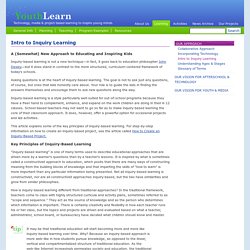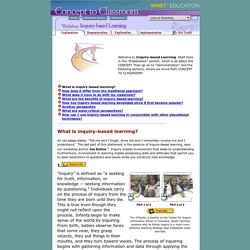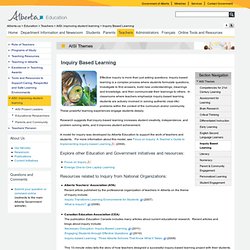

Learning - About Us. What Is Inquiry? Read Article in Spanish Inquiry is a dynamic process of being open to wonder and puzzlement and coming to know and understand the world.

As such, it is a stance that pervades all aspects of life and is essential to the way in which knowledge is created. Inquiry is based on the belief that understanding is constructed in the process of people working and conversing together as they pose and solve the problems, make discoveries and rigorously testing the discoveries that arise in the course of shared activity. Misconception Alert “Inquiry is not a “method” of doing science, history, or any other subject, in which the obligatory first stage in a fixed, linear sequence is that of students each formulating questions to investigate.
Rather, it is an approach to the chosen themes and topics in which the posing of real questions is positively encouraged, whenever they occur and by whoever they are asked. Inquiry is a study into a worthy question, issue, problem or idea. The Inquiry Project. Intro to Inquiry Learning. A (Somewhat) New Approach to Educating and Inspiring Kids Inquiry-based learning is not a new technique—in fact, it goes back to education philosopher John Dewey—but it does stand in contrast to the more structured, curriculum-centered framework of today's schools.

Asking questions is at the heart of inquiry-based learning. The goal is not to ask just any questions, of course, but ones that kids honestly care about. Your role is to guide the kids in finding the answers themselves and encourage them to ask new questions along the way. Inquiry-based learning is a style particularly well-suited for out-of-school programs because they have a freer hand to complement, enhance, and expand on the work children are doing in their K-12 classes.
This article explains some of the key principles of inquiry-based learning. Key Principles of Inquiry-Based Learning How is inquiry-based learning different from traditional approaches? In contrast, inquiry-based learning projects are driven by students. Inquiry-based Learning: Explanation.
What is inquiry-based learning?

An old adage states: "Tell me and I forget, show me and I remember, involve me and I understand. " The last part of this statement is the essence of inquiry-based learning, says our workshop author Joe Exline 1. Inquiry implies involvement that leads to understanding. Furthermore, involvement in learning implies possessing skills and attitudes that permit you to seek resolutions to questions and issues while you construct new knowledge. "Inquiry" is defined as "a seeking for truth, information, or knowledge -- seeking information by questioning.
" A Context for Inquiry Unfortunately, our traditional educational system has worked in a way that discourages the natural process of inquiry. Learning Through Inquiry. Inquiry Based Learning. Effective inquiry is more than just asking questions.

Inquiry-based learning is a complex process where students formulate questions, investigate to find answers, build new understandings, meanings and knowledge, and then communicate their learnings to others. In classrooms where teachers emphasize inquiry-based learning, students are actively involved in solving authentic (real-life) problems within the context of the curriculum and/or community. These powerful learning experiences engage students deeply. Research suggests that inquiry-based learning increases student creativity, independence, and problem solving skills, and it improves student achievement. A model for inquiry was developed by Alberta Education to support the work of teachers and students. Explore other Education and Government initiatives and resources: Resources related to Inquiry from National Organizations: Resources related to Inquiry from International Organizations: